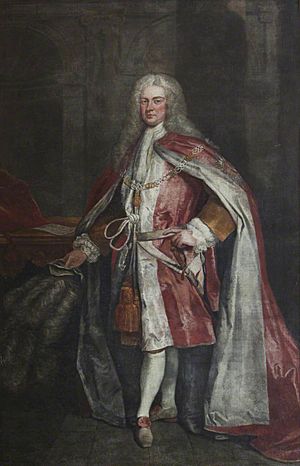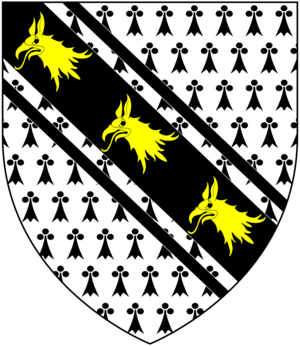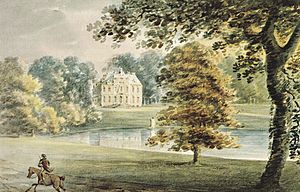Sir William Yonge, 4th Baronet facts for kids
Quick facts for kids
Sir William Yonge, 4th Baronet
|
|
|---|---|
 |
|
| Member of the British Parliament for Honiton |
|
| In office 1715–1754 |
|
| Member of the British Parliament for Tiverton |
|
| In office 1754–1755 |
|
| Yonge baronetcy | |
| In office 1731–1755 |
|
| Personal details | |
| Born | c. 1693 |
| Died | August 10, 1755 (aged 61–62) |
| Parents |
|
Sir William Yonge (born around 1693, died August 10, 1755) was an important English politician. He lived at Escot House in Devon. He served in the British Parliament for 39 years, from 1715 to 1754. He was known for his work in government and for helping to establish the Foundling Hospital, a place that cared for abandoned children.
Contents
Who Was Sir William Yonge?
His Family Background
William Yonge came from a well-known family in Devon, England. His father was Sir Walter Yonge, 3rd Baronet. His mother was Gwen Williams. William was also a great-great-grandson of Walter Yonge, who lived from 1579 to 1649. This earlier Walter Yonge was a lawyer and merchant. He kept detailed diaries that are still important for understanding British history from 1604 to 1645.
His Political Journey
In 1715, William Yonge became a Member of Parliament (MP) for Honiton, a town in Devon. He held this seat for a long time, until 1754. He also represented Tiverton in Parliament starting in 1754. In the House of Commons, he joined the Whig party. He became very helpful to Sir Robert Walpole, who was a leading politician at the time.
Because of his hard work, William Yonge received several important jobs. In 1724, he became a commissioner of the Treasury. This meant he helped manage the country's money. Later, in 1728, he became a commissioner of the Admiralty, which dealt with naval affairs. He returned to the Treasury in 1730. In 1735, he was made Secretary at War, a role that involved military matters.
William Yonge was known for defending the government. For example, in 1742, he strongly spoke against a motion by William Pulteney. In 1725, he was honored with the title Knight of the Bath (KB).
After making friends with the Pelham family, who were also powerful politicians, he was appointed Vice-Treasurer of Ireland in 1746. This was a job he held for life. In 1747, he was part of a group managing the trial of Lord Lovat. During this trial, he suggested that prisoners accused of serious crimes should be allowed to have lawyers help them. This idea was praised by many. In 1748, he became a Fellow of the Royal Society, a group that promotes science. He was also a founding Governor of the Foundling Hospital. This hospital was created to help children who had been abandoned.
When his father died in 1731, William Yonge inherited his title and Escot House. This house, located near Ottery St Mary in Devon, had been built by his father.
A Touch of Literature
Sir William Yonge also had a talent for writing poetry. Some of his poems were so good that people even thought they were written by the famous poet Alexander Pope. This made Pope quite annoyed! Sir William also wrote the words for a comic opera. This opera was based on an older play called The Jovial Crew. It was performed in London in 1730 and was very successful.
Family Life and Legacy
In 1716, William Yonge married Mary Heathcote. They later divorced in 1724. He then married Anne Howard. With Anne, he had two sons and six daughters.
Sir William Yonge passed away at his home, Escot, near Honiton, on August 10, 1755. His eldest son, Sir George Yonge, became the next Baronet and inherited his estates.
 | Jackie Robinson |
 | Jack Johnson |
 | Althea Gibson |
 | Arthur Ashe |
 | Muhammad Ali |



